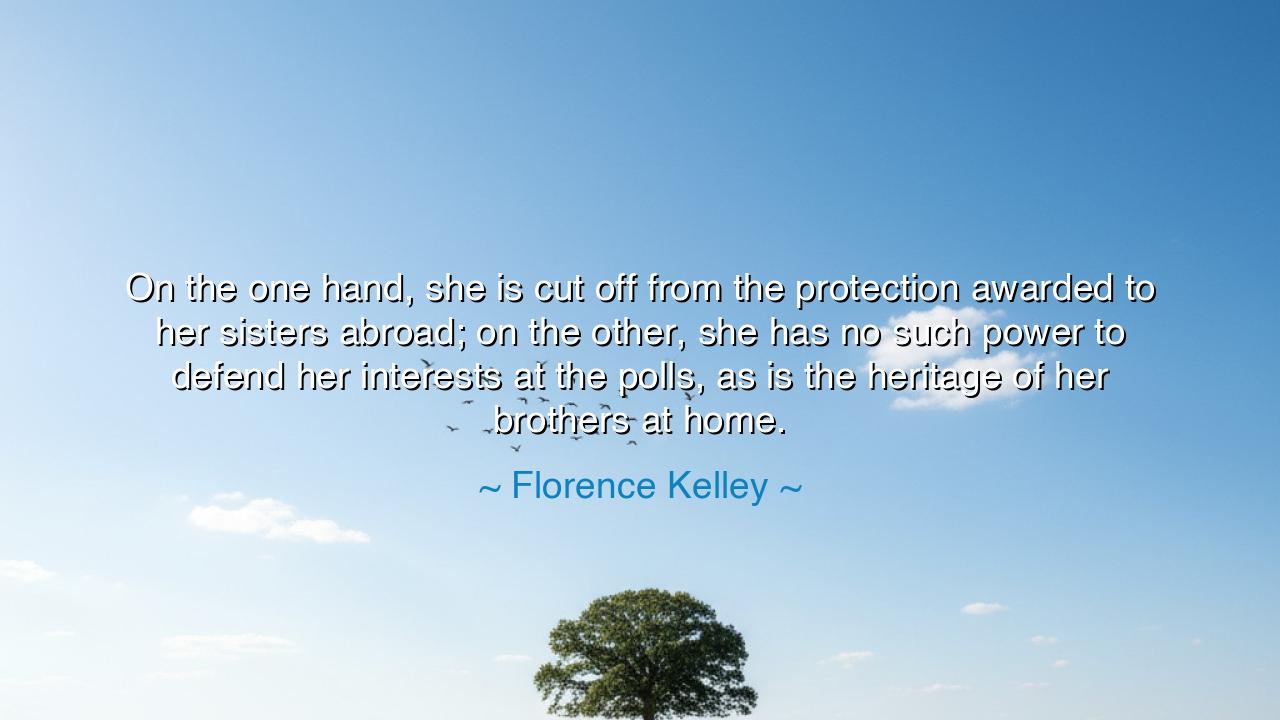
On the one hand, she is cut off from the protection awarded to
On the one hand, she is cut off from the protection awarded to her sisters abroad; on the other, she has no such power to defend her interests at the polls, as is the heritage of her brothers at home.






In the ledger of justice, Florence Kelley sets down a severe balance: “On the one hand, she is cut off from the protection awarded to her sisters abroad; on the other, she has no power to defend her interests at the polls, as is the heritage of her brothers at home.” Hear the iron music of that sentence. It is a weighing of two losses borne by one woman: the loss of shield and the loss of sword. Denied the workplace safeguards already granted to women in other nations, and denied the ballot that would let her demand those safeguards here, she stands doubly exposed—vulnerable in the mill and voiceless in the forum.
To grasp the meaning, imagine a worker in the dawn factories of the Republic: hours uncounted, machines unguarded, wages thin as thread. Across the ocean, her sisters abroad begin to gain shorter days, safer shops, inspectors with real teeth. But here she is told to wait, and when she seeks remedy by law, she finds another door barred: no vote, no say, no leverage at the polls. On the one hand she has less law; on the other she has less voice. Between those hands she is pressed like grain on the stone.
The origin of Kelley's cry lies in the hot heart of the Progressive Era, when reformers tallied child labor, sweatshops, and fires that turned wages into ashes. Kelley, trained in statistics and schooled by conscience, compared nations and saw the United States lag in protection for women and children. She argued that without suffrage—without the power to sanction or dismiss lawmakers—American women remained petitioners rather than partners. Her rhetoric yoked two fronts into one campaign: protective legislation now, political equality to secure it forever.
History offers a clarion example: the Triangle Shirtwaist fire of 1911. Flames climbed; locked doors held; 146 died, most of them girls. After the smoke cleared, commissions wrote codes and some factories changed. But the deeper cure—systemic, lasting, universal—required votes that could reward courage and punish delay. Where women organized and eventually won the ballot, the reforms endured; where they could not, gains frayed under profit’s weather. Kelley's sentence thus reads like a map: first, shield the body; next, arm the citizen.
Courts, too, reveal the contour of her vision. In Muller v. Oregon (1908), a brief of social facts—hours, health, motherhood—helped uphold limits on women’s labor. Kelley and allies understood both the promise and the peril: protection without power could be granted today and gutted tomorrow. Only when women could write, guard, and revise the laws themselves would reform cease to be charity and become heritage—the possession of equal citizens, like their brothers at home.
The wisdom, then, is stern and double-edged. Beware reforms that soften suffering but leave hierarchy intact. Beware, too, rights on paper that never reach the factory floor. Justice must be ambidextrous: one hand securing protection where bodies break; the other hand claiming power where choices are made. Kelley's cadence—on the one hand … on the other—is not mere rhetoric; it is a blueprint for building a society that does not rely on luck or paternal favor to keep women whole.
Take the lesson and make it law in your life. First, join efforts that bind workplace protection to political power—support organizing, fair inspections, and full voting access for all, especially those whose labor is least seen. Second, when you hear of reforms, ask Kelley's two questions: Does this shield the vulnerable now? Does it give them a voice later? Third, practice solidarity that crosses borders and streets: learn from our sisters abroad, and stand with our brothers at home in the one cause of equal dignity. Do these things, and you will help close the old, cruel gap—so no woman must choose between safety and citizenship, and so every worker carries both the shield of protection and the sword of the polls.






AAdministratorAdministrator
Welcome, honored guests. Please leave a comment, we will respond soon